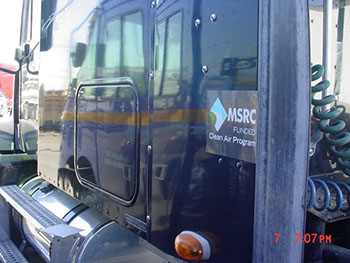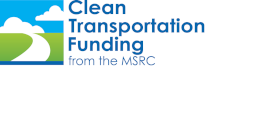 Now at its one-year anniversary, the Ports of Los Angeles and Long Beach's highly successful Clean Trucks Program got its start with a program funded in part by the MSRC. In 2002, the Gateway Cities Council of Governments (GCCOG) began its Truck Fleet Modernization Program, designed to provide incentive grants for older model diesel trucks toward the purchase of newer, cleaner diesel trucks to help reduce air pollution in Southern California.
Now at its one-year anniversary, the Ports of Los Angeles and Long Beach's highly successful Clean Trucks Program got its start with a program funded in part by the MSRC. In 2002, the Gateway Cities Council of Governments (GCCOG) began its Truck Fleet Modernization Program, designed to provide incentive grants for older model diesel trucks toward the purchase of newer, cleaner diesel trucks to help reduce air pollution in Southern California.
The MSRC contributed nearly $2.5 million in total to the GCCOG's program to replace trucks operating in and around the Ports of Los Angeles and Long Beach with cleaner diesel vehicles. In 2003, the MSRC provided $1 million to the program for replacement of model year-1983 and older trucks with newer lower-emission diesel trucks. The MSRC's participation in the program was so successful that in 2005, it provided nearly an additional $1.5 million to help offset the costs of replacing model year-1986 and older trucks. This second round of funding was expanded to target independent owner/operators of high-polluting trucks that were in most need of financial assistance and added an outreach component to ensure broad-based participation throughout the South Coast Air District.
"The MSRC's funding was vital to the success of the program because we were just about to run out of funding from the original grant provided by the U.S. EPA when the GCCOG started looking for new sources of funding and the MSRC came to the plate," noted Jack Joseph, Deputy Executive Director of the GCCOG. "The MSRC funding was important to keep the program going," said Joseph.
Clean Transportation Funding from the MSRC helped fund 67 trucks with model year-2000 and newer engines, providing, on average, two-thirds the cost of a newer truck. The estimated emission reductions for these trucks is 55-60 tons per year of NOx and 10-11 tons per year of PM. Participants that received MSRC funding all had direct ties to goods movement within the region.
"This funding was important for people that tried to fix their trucks but couldn't," said Anthony Grinden, a local truck operator who has been driving for more than 40 years and received MSRC funding. "I did everything I could to try to make my old truck cleaner, but it still wouldn't pass the smog tests, and new trucks are expensive. Private guys, like myself, needed help to do it."
Another recipient of Clean Transportation Funding from the MSRC said that these cleaner trucks are really helping to improve local air quality. "The air has definitely been cleaned up a lot at the ports," said Robert Cooper, an independent truck driver. "I can definitely see a difference in the air."
The GCCOG's program served as a predecessor to the Ports' Clean Trucks Program. "Our program served an important purpose in that it was the only game in town at the time and gave the ports a model for their current program," explained Joseph. The six-year pilot program, which concluded in 2008, provided $24.5 million in grants to replace 643 high-emitting trucks. The total projected emissions reductions is 468 tons of NOx and 232 tons of PM.
In October, the Ports of Los Angeles and Long Beach marked the one-year anniversary of their Clean Trucks Program by celebrating the removal of more than 2,000 diesel polluting trucks in the last year. This increases the total number of clean trucks at the Ports to 5,500, some of which were funded by the GCCOG's Truck Fleet Modernization Program.
"Without the GCCOG program, implemented with the help of MSRC funding, there would probably not be the Ports' program as it is today," commented Joseph.
Pictured below: Another GCCOG's program participant, Nazario Magallon, and his 2004 Freightliner cleaner diesel truck, purchased with Clean Transportation Funding from the MSRC.
